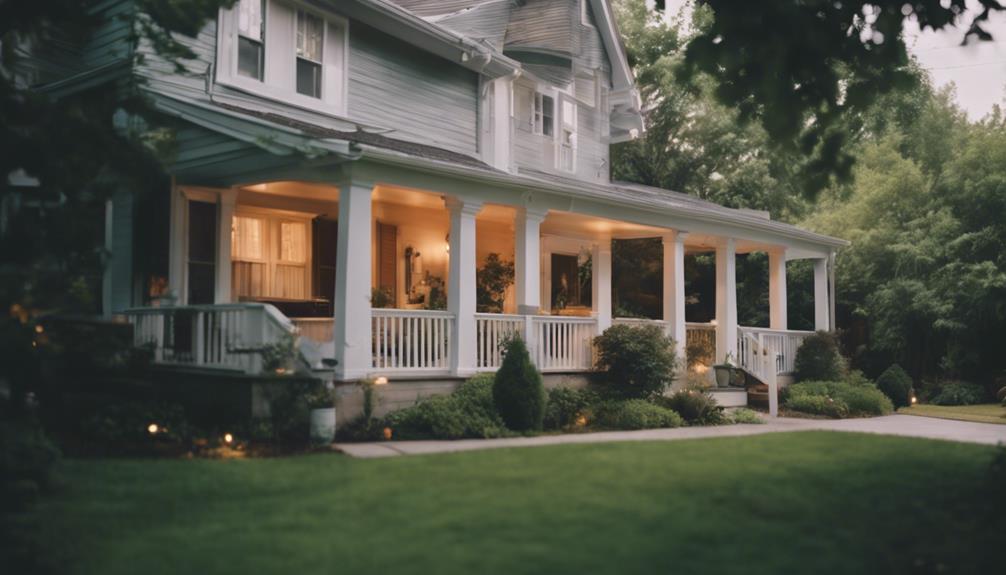To pick the right home security system, start by evaluating your specific security needs. Identify vulnerable areas in your home and assess the size and unique risks. Next, understand your budget; consider installation costs and ongoing monitoring fees. Explore your options between DIY installations and professional setups. Also, evaluate monitoring choices—professional offers 24/7 backup, while self-monitoring saves money. Research various features, like smart home integration, and compare top providers based on services and customer feedback. With these steps, you'll find the best fit for your needs, and there's plenty more insights to help you on this journey. Consider the level of technology you want in your home security system, such as video surveillance, motion sensors, and remote access. Some systems even offer home automation features, like controlling lights and thermostats from your smartphone. When comparing home security systems, be sure to look for reliable customer service and easy-to-use apps for remote monitoring. By thoroughly researching and comparing options, you can find the best home security system to keep your home and loved ones safe.
Key Takeaways
- Assess your home's specific security needs, identifying vulnerable areas and desired features like alarms and sensors.
- Determine your budget for equipment, installation, and ongoing monitoring fees before shopping.
- Choose between DIY and professional installation based on your home's size and your technical expertise.
- Evaluate monitoring options, considering the benefits of professional services versus cost-effective self-monitoring.
Assess Your Security Needs
To effectively choose a home security system, start by evaluating your unique security needs and identifying the vulnerable areas around your home. Focus on spots like back doors and first-floor windows, where security measures are most necessary.
Assess the size of your home; if it's smaller, you might find that DIY systems are sufficient. However, larger homes often benefit from professional installation to guarantee extensive coverage. Consider exploring options like top garage door openers to enhance your security further.
Consider your comfort level with security, as your location and environment can influence your choices. Are there specific security concerns unique to your household? Maybe you need fire alarms, motion detectors, or glass-break sensors for sliding doors. Identifying these specific needs helps tailor your system.
Additionally, keep in mind the initial costs associated with equipment and installation, which can range greatly. It's also important to think about ongoing monthly monitoring fees, which can add up over time.
Understand Budget Constraints

Understanding your budget constraints is vital when selecting a home security system, as costs can vary considerably based on features and services. Home security systems can range from $139.99 to over $599.99 for base packages, so you need to determine your budget before you start shopping.
Additionally, take into account that just like diversifying your investments, a well-rounded security system can provide better protection, similar to how converting a 401k to a Gold IRA can enhance your financial security through diversification of retirement portfolio. Don't forget to factor in installation fees, which typically range from $49 to $249.99, as they impact your overall budget.
Monthly monitoring costs also vary; professional monitoring can reach up to $49.99, while some systems, like Ring Alarm, offer no monthly fees. It's vital to take into account these ongoing costs, including potential cancellation fees, as well as the length of contracts that can extend up to three years, which affects your long-term financial commitment.
To help manage upfront costs, evaluate financing options, like 60-month interest-free plans. These can provide flexibility, allowing you to afford a thorough security solution without breaking the bank.
Explore Installation Options

When choosing a home security system, you'll want to reflect on your installation options carefully.
You can either go the DIY route for a quicker, cost-effective setup or opt for professional installation for expert assistance and ideal placement.
Additionally, it's important to evaluate the specific needs of your home, such as the number of entry points and desired features, which can help in making an informed decision.
For example, understanding what to look for in a home cleaning service might guide you in reviewing the reliability of the service providers if you decide to hire professionals.
Weigh the benefits and costs of each method to find what fits your needs best.
DIY Installation Benefits
Many homeowners find that DIY home security systems offer a quick and cost-effective solution for protecting their property without the need for professional installation. With an easy setup, you can often have your system running in less than an hour, saving on installation fees that typically range from $99 to $199.
Here's a quick comparison of DIY installation benefits:
| Benefits | Description |
|---|---|
| Flexibility | Easily adjust your system based on your needs. |
| Portability | Relocate components when moving homes. |
| Smart Home Devices | Integrate with existing devices for enhanced control. |
Moreover, most DIY systems don't require long-term contracts, giving you the freedom to modify your security setup without worrying about penalties. You can control everything through mobile apps, ensuring convenience and peace of mind. With systems like Ring Alarm and SimpliSafe, you'll enjoy a seamless experience that combines technology with user-friendly installation. So, if you're looking to take charge of your home security, consider the DIY approach for a personalized and efficient solution.
Professional Installation Advantages
While DIY installations offer flexibility and cost savings, choosing professional installation can greatly enhance your home security system's effectiveness and reliability.
Professionals guarantee ideal placement of security equipment, which can greatly improve your system's performance. Their expertise can also be likened to the careful approach taken in architectural solutions, where commitment to quality and sustainability plays a key role. They can set up your system in as little as 30 minutes or take up to 3 hours, depending on the complexity of the installation.
When dealing with complex systems, having an expert on hand is invaluable. They bring the necessary expertise to configure your security components, making sure everything integrates seamlessly—especially vital for larger homes with multiple entry points. This not only saves you time but also alleviates frustration if you're unsure about DIY setups or technology.
Additionally, many professional installation services offer warranties or guarantees, providing peace of mind that your system will operate correctly and meet your security needs.
Though you'll have installation fees ranging from $99 to $199, the benefits of expert setup and support far outweigh the costs.
Ultimately, professional installation can make your home security system more reliable and efficient, giving you the confidence you need to protect your home.
Installation Cost Considerations
Choosing between professional installation and DIY options involves weighing upfront costs against your comfort level with technology and the complexity of your security system.
Professional installation typically ranges from $99 to $249.99, depending on system complexity and the provider. For those who value efficiency and convenience, opting for professional assistance can guarantee your system is set up correctly from the start.
If you're looking to save money, DIY systems can be a smart choice. These often come pre-programmed for easier setup, allowing you to bypass installation fees.
However, consider your technical knowledge before diving into a DIY project. While some systems are straightforward, others may require a bit more expertise, especially when it comes to equipment placement. If you're unsure, professional installers can provide the necessary expertise to guarantee ideal setup, which may take anywhere from 30 minutes to 3 hours based on the system complexity.
Some providers, like SimpliSafe and Ring, offer installation services included in the overall system price, reducing separate installation costs.
Ultimately, evaluating your comfort with technology and the intricacies of your chosen system will help you decide the best path for installation.
Evaluate Monitoring Choices

When evaluating monitoring choices for your home security system, consider the benefits of professional monitoring versus self-monitoring options.
Professional services offer round-the-clock protection, ensuring you have immediate assistance in case of emergencies, much like how cats exhibit signs of attachment to their owners when they feel safe.
On the other hand, self-monitoring can save you money but requires you to act on alerts.
Understanding these differences will help you find the best fit for your needs and peace of mind.
Professional Monitoring Benefits
Professional monitoring services offer round-the-clock surveillance, ensuring you get immediate assistance during alarms or emergencies, which substantially boosts your home's security. Unlike self-monitoring options, these services provide a higher level of protection through trained personnel ready to respond.
Here's a quick comparison of key benefits:
| Feature | Description | Example Provider |
|---|---|---|
| 24/7 Surveillance | Continuous monitoring for threats | ADT |
| Immediate Response | Quick action during emergencies | SimpliSafe |
| Money-Back Guarantee | Assurance of satisfaction | Various Providers |
Typically, monthly fees for professional monitoring range from $5 to $65+, with options like SimpliSafe starting as low as $10/month. Many services include features like live guard protection and emergency dispatch, ensuring you have trained personnel on call. With ADT's extensive experience and numerous monitoring centers across the U.S., you can feel confident that your home is in capable hands. Remember, investing in professional monitoring can substantially enhance your home security, offering peace of mind that self-monitoring simply can't match.
Self-Monitoring Cost Considerations
Self-monitoring home security systems can be a budget-friendly solution, allowing you to save on monthly fees while still maintaining control over your home's safety. Many self-monitoring options, like Ring and SimpliSafe, don't require subscriptions for basic functionality, making them attractive to budget-conscious consumers.
Additionally, incorporating smart organization techniques can help streamline your monitoring process and reduce clutter in your home. While you can enjoy savings, it's crucial to evaluate the effectiveness of self-monitoring compared to professional monitoring.
With self-monitoring, all responsibility for responding to security alerts falls on you. This can be manageable if you're comfortable using app notifications and other features. Some systems offer advanced features such as video storage, which can enhance your monitoring experience without the ongoing costs associated with professional services.
However, remember that professional monitoring services typically cost between $10 to $50 per month. If you choose self-monitoring, assess your lifestyle and how quickly you can respond to alerts. The effectiveness of your system depends on your ability to act promptly in case of an incident.
Ultimately, weigh the savings against the potential risks to ascertain you're making the best choice for your home security needs.
Real-Time Alerts Importance
Real-time alerts play an essential role in keeping you informed about security breaches, enabling you to take immediate action or alert authorities as needed. With professional monitoring services offering 24/7 alerts, you gain immediate awareness of any potential threats, ensuring quick response times from monitoring centers. Depending on the provider, you can expect costs to vary, but the peace of mind is invaluable.
Here's a quick comparison of monitoring options:
| Monitoring Type | Key Features |
|---|---|
| Professional | 24/7 alerts, quick response times |
| Self-Monitoring | Push notifications, customizable alert settings |
| Cost Range | $5 to $65+ monthly |
| Response Time | Average of 3.4 seconds (Alder) |
| Emergency Services | Direct connection with authorities |
Having customizable alert settings allows you to prioritize notifications based on your specific security needs. Whether you choose to go with professional monitoring or a self-monitoring system, the importance of real-time alerts in your home security systems cannot be overstated. They provide you with the tools to protect what matters most.
Research System Features

When researching system features, you'll want to take into account the range of equipment available, such as cameras, sensors, and alarms, to guarantee your home is thoroughly protected. The best home security systems offer a variety of security devices that cater to different needs.
Consider whether you prefer DIY security systems, which provide simple installation, or systems that require professional installation for a more all-encompassing setup.
Next, evaluate the monitoring options available. Professional monitoring offers 24/7 protection but comes with a subscription plan that may increase ongoing costs. On the other hand, self-monitoring can save you money, though it requires more personal responsibility.
Smart home integration is another essential feature. Look for systems that work seamlessly with devices like Amazon Alexa or Google Assistant, allowing you to control your security easily.
Don't forget to review the customer service quality, as it can impact your experience. By considering these aspects, you'll find a security system that meets your needs while keeping your budget in check.
Compare Top Providers

To find the best home security system, it's crucial to compare top providers based on their features, pricing, and user experience.
ADT stands out with over 140 years of experience, offering robust professional monitoring and a six-month money-back guarantee.
If you're looking for DIY home security systems, SimpliSafe excels with easy installation and affordable starter kits, while monitoring plans start as low as $10/month.
For smart home security, Vivint integrates seamlessly with smart devices and provides customizable home automation solutions, making it ideal for tech-savvy users.
Ring Alarm offers a budget-friendly DIY option with no contract requirements, appealing to those who want flexibility in their monitoring plans.
Abode is another strong contender, known for its smart-home compatibility with various manufacturers and starter kits priced as low as $100.
When comparing these home security companies, consider how their security systems allow you to tailor your setup to your needs.
Whether you prefer professional monitoring or a DIY approach, understanding the strengths of each provider helps you make an informed decision for your home's safety.
Review Customer Feedback

Customer feedback offers valuable insights into the reliability and user experience of home security systems, helping you make a more informed choice. Analyzing reviews can guide you toward options that best meet your needs. Here are four key aspects to focus on:
- Reliability: Look for comments on how well the system performs in real-life situations. Users often share experiences regarding the system's uptime and response times.
- Ease of Use: Check feedback on installation processes and monitoring apps. If users find a system easy to set up and navigate, it's likely to save you time and frustration.
- Overall Satisfaction: Pay attention to average ratings and recurring themes in user experiences. High satisfaction rates often indicate dependable products.
- Common Complaints: Note any issues regarding equipment durability, false alarms, or customer service. These factors can greatly affect your peace of mind.
Frequently Asked Questions
How to Choose the Right Security System for Your Home?
To choose the right security system for your home, assess your specific needs, evaluate your budget, decide on installation type, explore monitoring options, and research customer reviews to guarantee it fits your lifestyle and environment.
What Is the Best Home Security System Brand?
When it comes to home security, think of it like choosing a loyal knight for your castle. ADT's reliability, Vivint's smart features, SimpliSafe's affordability, Ring's accessibility, and Abode's customization each offer unique strengths.
How Do I Choose a Wireless Security System?
When you choose a wireless security system, focus on easy installation, flexible monitoring options, smart home compatibility, and essential features. Also, check the manufacturer's reputation and customer reviews for reliability and privacy policies.
How Many Sensors Do I Need for Home Security?
Picture your home's entry points like open doors inviting trouble. You'll need 3-5 sensors for small spaces, but larger homes often require 10 or more. Prioritize vulnerable areas to create a strong security barrier.
Conclusion
In summary, choosing the right home security system is essential for your peace of mind.
Did you know that homes without security systems are 300% more likely to be broken into?
By evaluating your needs, budgeting wisely, and exploring various options, you can find a solution that fits your lifestyle.
Take the time to compare providers and read customer feedback—your home deserves the best protection.
Stay safe and secure with the right system in place!









